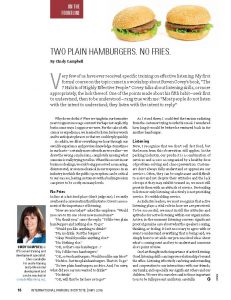 by Cindy Campbell
by Cindy Campbell
Very few of us have ever received specific training on effective listening. My first formal course on the topic came in a workshop about Steven Covey’s book, “The 7 Habits of Highly Effective People.” Covey talks about listening skills, or more appropriately, the lack thereof. One of the points made about his fifth habit—seek first to understand, then to be understood—rang true with me: “Most people do not listen with the intent to understand; they listen with the intent to reply.”
Why do we do this? Were we taught in our formative years to ignore message content? Perhaps not explicitly, but in some ways I suppose we were. For the sake of efficiency or expedience, we learned to listen for key words and to anticipate phrases so that we could reply quickly.
As adults, we filter everything we hear through our own life experience and previous knowledge. Sometimes in our haste—certainly more often than we realize—we draw the wrong conclusions, completely missing what someone is really trying to tell us. When this occurs in our business dealings, we risk being perceived as uncaring, disinterested, or even mechanical in our responses. In an industry in which the public’s perception can be critical to our success, leaving customers with a bad impression
can prove to be costly on many levels.
No Fries
In line at a fast-food place (don’t judge me), I recently overheard a conversation that illustrates Covey’s assessment of the importance of listening.
“How are you today?” asked the employee. “Would you care to try one of our new menu items?”
“No, thank you,” came the reply. “I’d like two plain hamburgers and nothing else. To go.”
“Would you like anything to drink?”
“No, no drink. Just the burgers.”
“Okay. Would you like anything else?”
“No. Nothing else.”
“OK, so that’s one hamburger …”
“No, I’d like two hamburgers.”
“OK, so two hamburgers. Would you like any fries?”
“No fries. Just two plain hamburgers. That’s it. To go.”
“So two plain hamburgers, no fries. And, I’m sorry, what did you say you wanted to drink?”
“No drink.”
“OK, will that be for here or to go?”
As I stood there, I could feel the tension radiating from the customer trying to order his meal. I wondered how long it would be before he ventured back in for another hamburger.
Listening
Now, I recognize that we don’t sell fast food, but the lesson from this observation still applies. In the parking industry, our product is a combination of services and access accompanied by a healthy dose of problem-solving and chaos prevention. Customers
don’t always fully understand or appreciate our services. Often, they can be unpleasant and difficult to assist and yet despite their attitudes and the lack of respect they may exhibit toward us, we must still provide them with an attitude of service. Pretending to listen or only listening selectively is not providing service. It’s withholding service.
As industry leaders, we must recognize that active listening plays a vital role in how we are perceived. To be successful, we must instill the attitudes and aptitudes for active listening within our organization. Active, in-the-moment listening conveys significant proof of genuine care about what the speaker is saying, thinking, or feeling. It isn’t necessary to agree with or even to understand everything that is being said; we simply have to set aside our preconceived ideas about what’s coming next and try to understand someone else’s point of view.
One last thought on the importance of active listening: Good listening skills can improve relationships beyond the office. Listening effectively can bring understanding and cooperation to our interactions with our friends, our family, and especially our significant others and our children. We owe it to ourselves and to those important to us to be fully present and listen carefully.
CINDY CAMPBELL is IPI’s senior training and development specialist. She is available for onsite training and professional development and can be reached at campbell@parking.org.
TPP-2016-05-Two Hamburgers. No Fries.



 By Jeff Perkins
By Jeff Perkins

 By Cindy Campbell
By Cindy Campbell